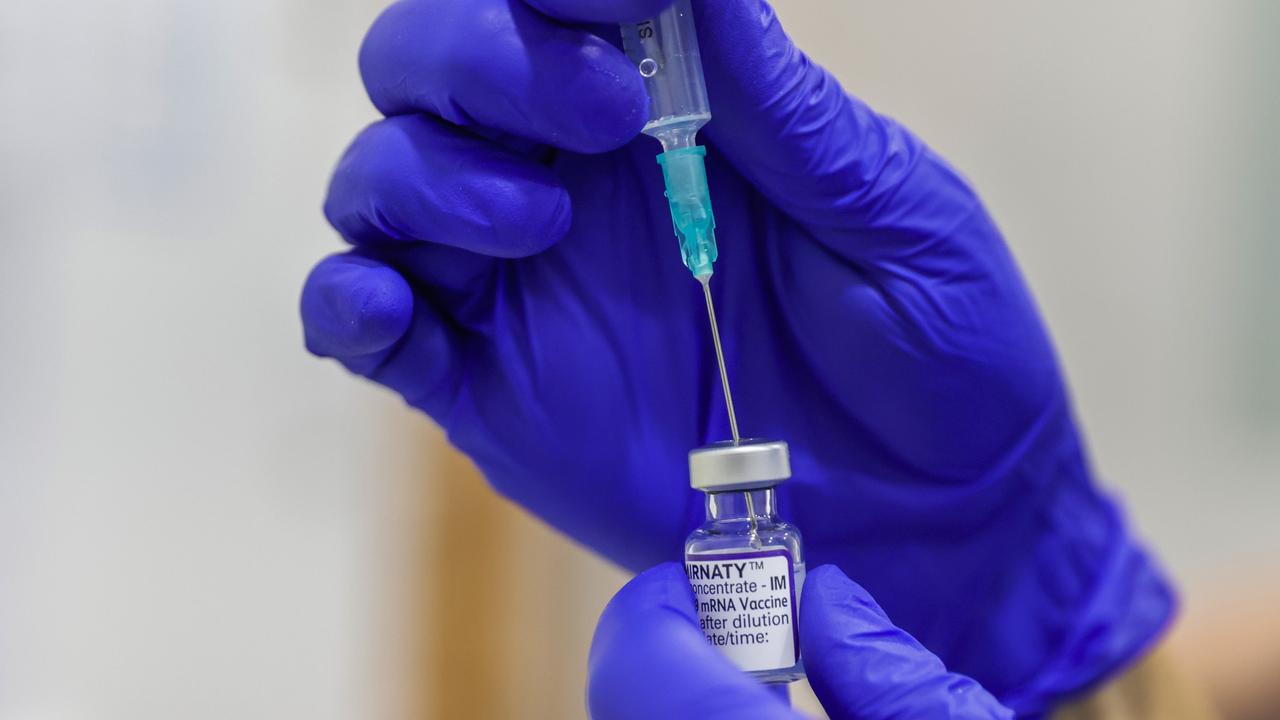Ivermectin: Facts and conspiracies about the drug people claim cures Covid
Ivermectin is a drug used to deworm sheep and treat scabies in humans. It has also been touted as a cure all for Covid by the likes of Donald Trump and Australian MP Craig Kelly. So how do their claims stand up against the science?
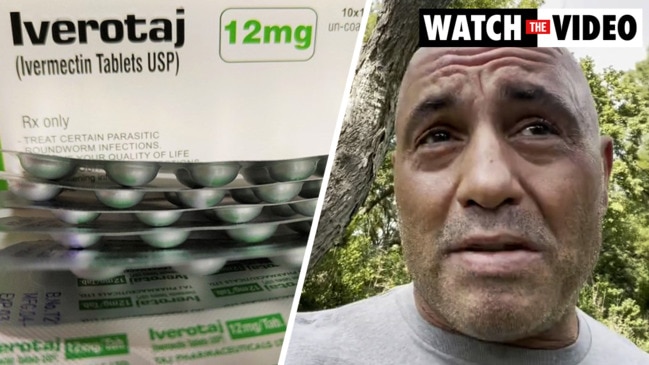
NSW Coronavirus News
Don't miss out on the headlines from NSW Coronavirus News. Followed categories will be added to My News.
Ivermectin is the cheap, widely available drug used to treat head lice, scabies and intestinal parasites in humans, and a dewormer in horses and sheep. It is also championed by the likes of former US president Donald Trump, federal politician Craig Kelly, anti-vaxxers and some rogue doctors as an effective treatment for Covid.
While there is irony in the fact that those who call the rest of us ‘sheeple’ for following approved therapies for Covid, swear by a sheep dewormer as a magical cure for Covid, the drug itself has been plagued by fraudulent scientific papers, wild claims, overdoses from those self-medicating and is at the centre of a conspiracy theory.

Ivermectin is not approved for the treatment of Covid in Australia because “there is insufficient evidence to validate the use of Ivermectin in patients with Covid-19” according to a statement last month from the Therapeutic Goods Administration (TGA).
Merck, the company that makes Ivermectin, put out a statement in February against its use for Covid.
“It is important to note that, to-date, our analysis has identified:
■ No scientific basis for a potential therapeutic effect against Covid-19 from preclinical studies;
■ No meaningful evidence for clinical activity or clinical efficacy in patients with Covid-19 disease, and;
■ A concerning lack of safety data in the majority of studies.
“We do not believe that the data available support the safety and efficacy of Ivermectin beyond the doses and populations indicated in the regulatory agency-approved prescribing information,” the statement says.
But in the conspiracy-rich pandemic world, all of this just feeds into the narrative that cheap, effective drugs like Ivermectin are being overlooked in favour of vaccination.
It is the Covid version of black salve, the alternative caustic skin cancer treatment that just burns holes in your skin. Those who subscribe to the theory have been seeking out prescriptions or ordering the drug online.
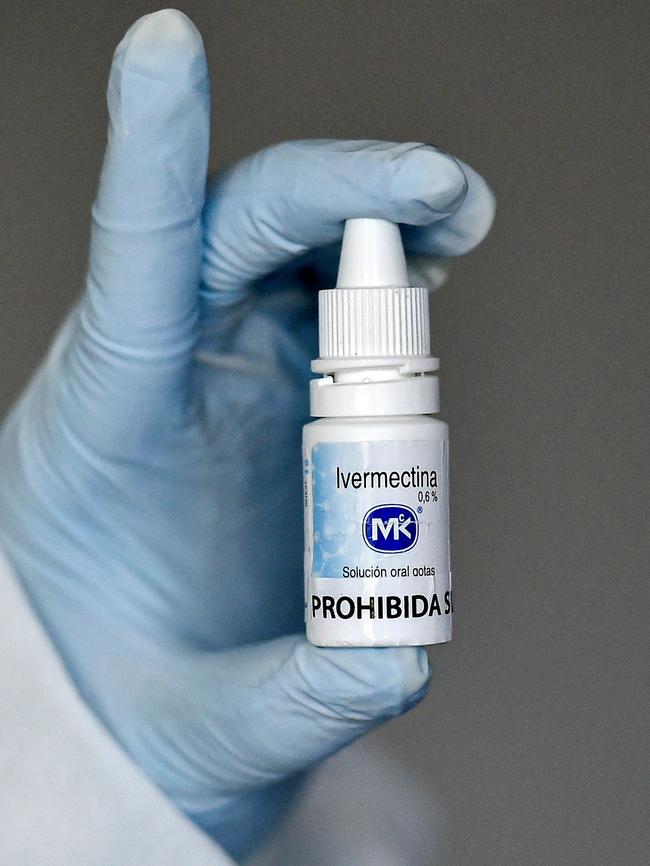
In the 2020-21 financial year to May 31, 2021, about 12,950 PBS prescriptions for Ivermectin 3mg tablets were dispensed in Australia, up 15 per cent on the previous year.
Last month a Covid-positive patient presented to Westmead Hospital with vomiting and diarrhoea “not due to Covid, but from an overdose of the drug Ivermectin”.
On Friday, the TGA banned GPs from prescribing Ivermectin tablets for Covid-19 and can now only prescribe the medication for approved conditions including scabies and certain parasitic infections.
Last week a doctor was suspended by the NSW Medical Board for social media posts about using Ivermectin and supplements to treat Covid.
There is also a group called Doctors For Covid Ethics who warn “of short term and long term dangers from Covid-19 vaccines” and another group called the Covid Medical Network who also champion Ivermectin.
The TGA issued fresh warnings to doctors prescribing Ivermectin as a treatment for Covid-19 following the surge in scripts.
“Doctors that prescribe Ivermectin off label must consider the potential risks and benefits, and obtain informed consent from patients about the condition and treatment options,” the TGA said on August 23.
So what is the science on Ivermectin?
The drug won the 2015 Nobel prize in Physiology or Medicine for its intended use as a treatment for parasites, but its new found fame stems from being one of a host of drugs tested to see if it could be repurposed for Covid.
Professor Andrew McLachlan, head of school and dean of pharmacy at the University of Sydney, said Ivermectin was first identified as a potential Covid-19 treatment in April 2020 because it could kill the virus in a petri dish in a lab.
“It was screened with a number other drugs to see if it could be repurposed for Covid. This was conducted at Monash University Melbourne and they identified certain concentrations of Ivermectin could inhibit the replication of the SARSCoV2 virus which causes Covid-19 and that led to considerable interest in a possible repurposed therapeutic medicine for Covid,” he said.
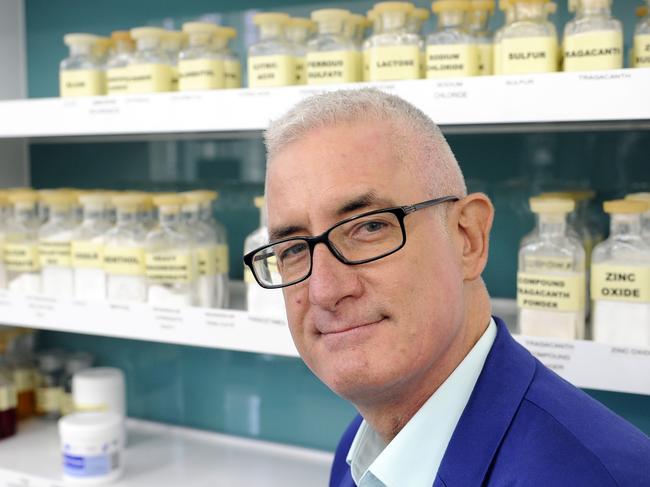
But the concentrations used in the lab testing were much higher than doses normally used in humans. The early findings led to trials around the world, and many of which were badly designed.
But in the age of social media, that upside down world where legitimate science is viewed as suspicious and nonsense is rebranded as fact, Ivermectin grew its own set of wings, especially among the anti-vax, anti-mask and Covid denying likes of high-profile US podcaster Joe Rogan who admitted to self-medicating with Ivermectin after being diagnosed with Covid in late August.
In the US, the National Poison Data System (NPDS) reported a 245 per cent jump in reported Ivermectin exposure cases from July to August — from 133 to 459.
Emergency rooms across the US are treating more patients who have overdosed on the version of the drug that is meant for animals, prompting the health regulator to remind people: “You are not a horse. You are not a cow, Seriously y’all. Stop it.”

“Ivermectin is considered safe at regular doses (but side effects can be) nausea and vomiting, and at high doses it can cause skin rashes and effects on the nervous system, including seizures and particular worse if people are taking high doses and that has been the concern from the TGA about warnings if you are using a medicine not designed for humans, such as the veterinary product,” Prof McLachlan said.
One of the largest studies that showed benefit was retracted do to ethical concerns because large slabs seemed to have been copied and pasted from press releases, then in July, a Cochrane Review meticulously analysed every study conducted on Ivermectin for Covid so far.

They found it didn’t work.
“Cochrane Library set a very high standard and that review concluded there is significant uncertainty about the benefit of Ivermectin as a possible treatment to prevent or treat Covid, so that leaves us with the recommendation that is it not a suitable treatment by our own Covid-19 Clinical Evidence Taskforce,” Prof McLachlan said.
The task force, which continuously updates the latest clinical data to treat Covid, has not recommended Ivermectin unless in a trial setting.
“There are ongoing trials of Ivermectin and being in a trial makes sense, you know you are getting a dose approved by an ethics committee, you are being monitored to see if it is helping not harming you and that task force aligns with the Cochrane Library about not recommending Ivermectin as a treatment because of uncertainly of its effectiveness.”
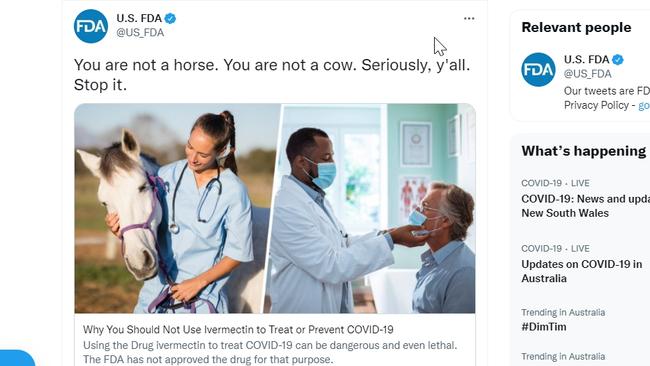
Despite the dubious science so far, Oxford University is now performing a gold standard PRINCIPLE (Platform randomised trial of treatments in the community for epidemic illnesses) trial that will focus on patients who have recently developed symptoms of Covid-19, and will give three days of Ivermectin to look at whether fewer are admitted to hospital than when compared with standard of care.
The trial should be finished by the end of 2021.
“The PRINCIPLE study has been one of those studies designed to a very high standard to measure whether it is about clearance of the virus or more important end points such as hospitalisation, the need for oxygen and ventilation and death. The idea would be to look at the recommended regimen for Ivermectin (for patients) with mild illness (the largest group) to stop them progressing and help them recover,” Prof McLachlan said.
So in the words of the FDA, you are not a horse. Stop it.
“Social media has many benefits connecting people during lockdown to make sure people feel connected but it generates another range of people who are promoting what would only be considered risky strategies to manage Covid without any evidence and put vulnerable people at risk in my view,” Prof McLachlan said.
Got a news tip? Email weekendtele@news.com.au




